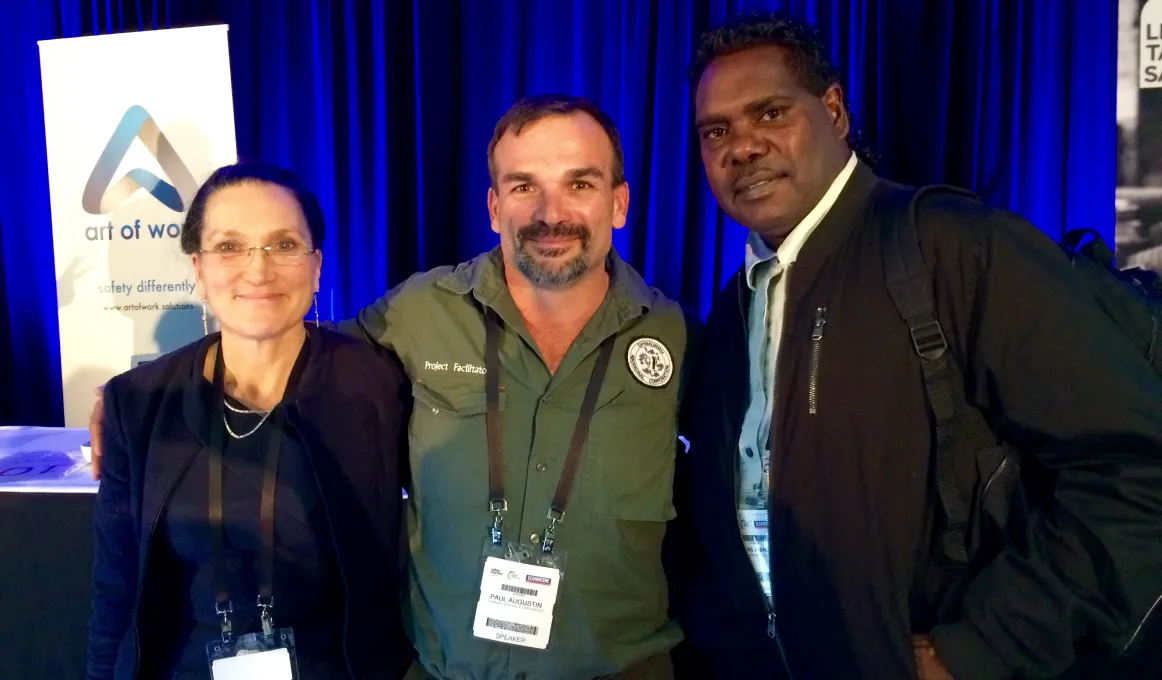Work on Country must include Health and Safety

The Dhimurru Rangers of eastern Arnhem Land manage a beautiful yet dangerous land and seascape and in order to remain healthy and safe, have devised Work Health and Safety practices which include the Yolgnu concepts of Raypirri, Djaka and Ralpa.
Protecting and managing the ancient land and seascapes of Australia is potentially dangerous. To keep themselves healthy and safe, the Dhimurru Rangers of Arnhem Land devised a Work Health and Safety plan appropriate to their culture and particular needs.
The Dhimurru Indigenous Protected Area covers over 550,000 hectares of the north eastern part of Arnhem Land including many offshore islands. The ranger duties include conservation work, management of feral animals and removal of invasive pests like weeds and the yellow crazy ants. They regularly use poisons, encounter dangerous animals like crocodiles and buffaloes and use fire to manage their land.
In addition, they are faced with risks associated with the onset of the rainy season and approaching cyclones. They often travel for hours inland or to islands far from the mainland so when something goes wrong, help is far away.
To keep themselves healthy and safe, the Dhimurru Rangers met to produce a Work Health and Safety plan to meet their particular needs. They agreed on the big risks and developed instructions to deal with them. And they are justly proud of their plan, created and implemented in a culturally appropriate way.
Each morning they meet to decide what jobs need doing and the associated safety risks. They discuss safety issues from the day before and incorporate them into the day’s job design. They decide on who should lead in managing the job, and who still needs training in that job. Two-way radios keep everybody in touch and GPS coverage enables the base coordinator to know where everybody is.
Paul Augustin, Project Facilitator at Dhimurru Aboriginal Corporation said that safety was already on everybody’s mind.
“But it was using local language concepts as part of our safety protocols which has given them a greater sense of ownership and pride in work health and safety at Dhimurru and a better connection and understanding,” Paul said.
The key Yolngu concepts important to the plan are Raypirri (being disciplined), Djaka (being careful) and Ralpa (being committed and enthusiastic).
Paul and Thomas Amagula from the Corporation recently presented their plan to a Safety in Action conference in Sydney through a video called Yolŋu and Ngapaki: Getting the WHS balance right.
Dr Peta Miller from Safe Work Australia (SWA) said that after the video presentation, the Dhimurru Rangers handled the numerous questions with great skill.
“The audience applause was huge,” Peta said.
“I had numerous senior people from government and the private sector tell me how impressed they were.”
Paul said many at the conference found their presentation empowering.
“To be honest, for me, it was more about working together with the Yolngu and Ngapaki Gove community to produce a product that everyone enjoyed being a part of, and showing us doing what we love doing safely: Working on Country.”
Find out more
The Dhimurru Rangers are funded by the Australian Government, through the Indigenous Rangers - Working on Country program. This program creates employment, training and career pathways for Indigenous people in land and sea management.
More information is available at Dhimurru Aboriginal Corporation.
Yolŋu and Ngapaki: Getting the WHS balance right presentation is available on the Dhimurru Facebook page as well as at Safe Work Australia.